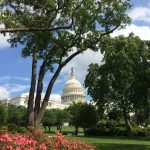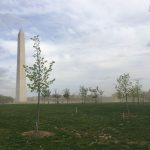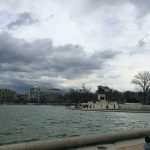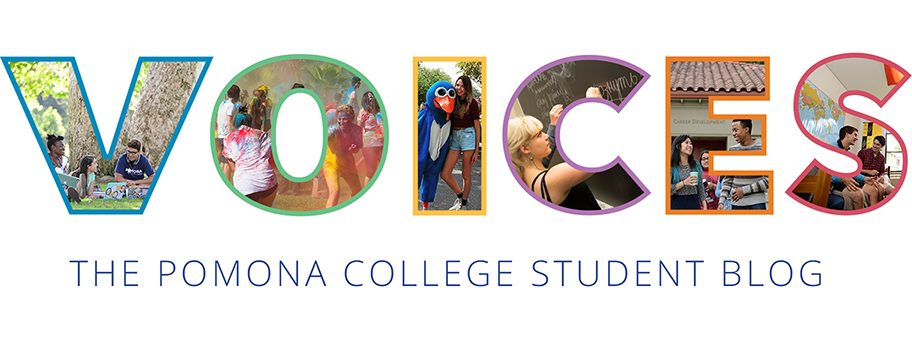By Blake Plante ‘19
I spent last spring interning with the National Endowment for the Humanities Research Division as part of Claremont McKenna College’s 5-College Washington Program in which students spend a semester in D.C. interning full-time and taking several classes. The program had been infiltrated by Pomona students this time, its roster comprised entirely of six of us Sagehens.
 The program was not only a good way to get a taste for D.C., but also to anticipate how life might be after graduation. It helped me line up opportunities for the near future and gave me valuable full-time working experience in a demanding environment. The CMC D.C. program is in the midst of major changes, so my reflections may not be entirely applicable for the students going on the program this spring. However, I’d like to think that some of this advice will be applicable regardless of the program’s structure and even applicable to students on other off-campus programs.
The program was not only a good way to get a taste for D.C., but also to anticipate how life might be after graduation. It helped me line up opportunities for the near future and gave me valuable full-time working experience in a demanding environment. The CMC D.C. program is in the midst of major changes, so my reflections may not be entirely applicable for the students going on the program this spring. However, I’d like to think that some of this advice will be applicable regardless of the program’s structure and even applicable to students on other off-campus programs.
- Seek out experiences beyond the program’s classes and get-togethers.
The program has several evening classes and schedules many events for students, including special meetings with authors of many of the books we read in class. I benefited a great deal from this structure, but perhaps even more so I benefited from carving out a life for myself beyond the program. D.C. has a lot to offer: countless cultural artifacts in free museums, valuable events at think tanks and research institutions where you can learn from the nation’s top experts, and incredible performances at theatres and open mics. It’s the kind of city where a lover of learning can thrive.
These experiences, however, you have to actively seek out for yourself, whether by planning or by simply wandering. It was through wandering that I happened to discover a place where Bernie Sanders was speaking and sneak in. At one point, I met Jeb Bush. Through all my adventures to think tanks like the Wilson Center, the Brookings Institution, CSIS, etc., I got to meet and talk with all kinds of scholars and public figures—Amy Chua, Stephen Kotkin, etc. At universities and local art schools, I met and heard from artists and journalists like Wendy MacNaughton and John Walcott.

I witnessed the filming of a rap video where a kaleidoscopic Aston Martin cruised along the Hirshhorn Museum’s sidewalk, and found Emmanuel and Brigitte Macron boarding an Osprey aircraft near the Washington Monument. I visited nearly all of the Smithsonian museums, many of them several times (the Hirshhorn six). A dance here and a visit to the local Unitarian Universalist church there, and it becomes easy to build a community for yourself. Cupcake shops and solitary walks satiate the consumptive and the contemplative. Because I made time in the evenings and weekends and sought things out, I couldn’t mark a single week where I hadn’t discovered something blissful or something that challenged me.
- Be aware that the program’s administrators know you’re busy.
The administration is probably overly aware of all the demands on your time, and maybe even wary to push you as much as you should be pushed. Don’t let your class work begin to seem trivial, even if it appears that there is not a lot of it and that little is expected of it. For me, working with a lighter load than I expected led me to put less work into the classes than, on second thought, I would have liked to. I put other experiences and opportunities first, and, in doing so, may have missed out a bit on what the program’s classes offered. We had the honor of meeting and probing the minds of several of the authors we were reading, which can be a fantastic resource for the well-prepared student, and I felt that I didn’t use that opportunity to its fullest.
- Cook.
I won’t profess to offer a panacea other than rice because cooking three meals for yourself each day can be arduous, but this may be your first time living alone and cooking entirely for yourself. You might be tempted to splurge on microwave meals, delivery, and eating out. If you can afford that, too bad for you, because there can be much joy and self-discovery in learning to cook. I remember fondly the day I crammed pancakes into a plastic container and left them marinating in syrup for lunch. I was so excited to make hummus, too, and when I picked up a cheap smoothie-maker I was ecstatic. I did eventually tire of making rice with a choice of meat and/or fresh vegetables most of the time and of clean-up, but in the end it was worthwhile to get on healthily and scrumptiously with so little money. Consider having a talk with the college’s nutritionist before going to D.C., and perhaps pick up a few cheap appliances like a rice cooker and a smoothie maker.
- I hope you’re happy.
 My internship at the National Endowment for the Humanities Research Division was the perfect opportunity to learn the ecology of the American education system, and it allowed me to reach out, meet, and spend quality time with all kinds of scholars. I thoroughly enjoyed the work and found it both substantial and rewarding. Because I liked what I was doing, it was easy to meet people and establish good friendships within and beyond the agency. Internships can be stimulating, but they can also be droll and uninspiring. If you put in your best effort but don’t feel happy in your internship, try to find something that stimulates you more.
My internship at the National Endowment for the Humanities Research Division was the perfect opportunity to learn the ecology of the American education system, and it allowed me to reach out, meet, and spend quality time with all kinds of scholars. I thoroughly enjoyed the work and found it both substantial and rewarding. Because I liked what I was doing, it was easy to meet people and establish good friendships within and beyond the agency. Internships can be stimulating, but they can also be droll and uninspiring. If you put in your best effort but don’t feel happy in your internship, try to find something that stimulates you more.
